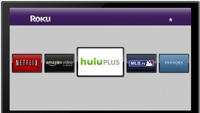New online alternatives promote à la carte viewing

New online television alternatives are now shipping or are about to be shipped, as a campaign begins to get viewers to “cut the cord” to cable and to go online. However, as with most new technologies, all is not perfect — yet.
Google TV, Apple TV and Roku have new boxes that allow viewers to disconnect from cable and watch a growing number of television programs and movies. Each could eventually offer a disruptive alternative to traditional television business models.
As columnist David Pogue summed it up in the “New York Times,” “At this point, the future of TV is still up in the air, if not over the air. Each [device] is inexpensive, each is half-finished — but each could be the gateway to a disruptive new future of à la carteTV.”
With network executives still fighting over the price of Apple’s 99-cent television program rentals, Apple television’s ($99) scope of service is still limited. The Roku box (starting at $60), which also uses apps to allow customers to create their own channels, connects with the Amazon video store to allow the purchase of movies. But so far, like the Apple product, its selection of content is limited and still developing.
Last week, details became available on the much-anticipated Google TV “Revue” box made by Logitech. It will cost $299 and is now available for pre-order. It’s scheduled for delivery by the end of October. Unlike the cheaper Apple and Roku boxes, Logitech worked closely with Google to make the keyboard a definitive means of navigating Google TV’s services.
Google TV will focus on the Android-based platform’s hybrid TV/Web searching and TV apps. The box has a lot of extras, including several optional controllers, HD video chat and dozens of applications.
Google, however, has been having similar problems to Apple in attracting content partners. Several television networks, Internet and media companies, including HBO, CNBC and Twitter, will be its partners in offering Web content and programming via televisions. But the major networks — ABC, CBS, Fox and NBC — were absent from Google’s content partnerships.
Get the TV Tech Newsletter
The professional video industry's #1 source for news, trends and product and tech information. Sign up below.
Google has been in talks with the major television networks and the major cable and satellite distributors about collecting TV schedules and programs for search purposes, but so far there are few concrete partnerships.
Google argues that the main reason people are spending less time watching television and more time on their cell phones and computers is because TVs lack the Web. By turning television screens into a Web portal, Google and other companies like Apple, TiVo, Boxee and Roku hope to be a part of the five hours a day that the average American spends watching TV programming and ads.
In the case of all the new online boxes, users are able to line up an increasing numbers of apps to build their own television-viewing dial. With Google TV, the company announced apps last week that include the “New York Times” and “USA Today” news, and music sites VEVO, Napster and Pandora.
